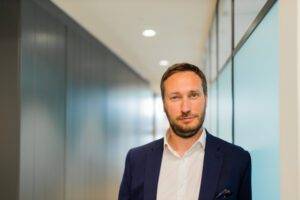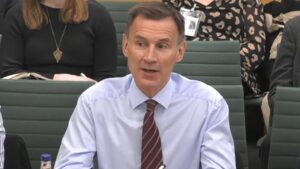Secrets of Success: Branwell Moffat, Founder and Director CX Consulting

<?xml encoding=”utf-8″ ?????????>
Branwell Moffat is the Director of CX Consulting at KPS Digital in the UK; an award-winning SAP partner and SAP CX SI in London. With over 20 years experience helping companies grow their digital businesses to levels of individual revenues in excess of $500 million per year, he works on a consultative approach with customers, layering a mixture of CX, business and technical consultancy that ensures that the solutions that they design, fit the strategic, business and technical objectives of each company. He takes some time out of his day to share his thought processes and Secrets of Success with Business Matters …
What is the main problem you solve for your customers?
Many of our customers come to us with a general idea of what they want to achieve but without the knowledge of how to do so.We work with them to uncover the key business and technical objectives and design pragmatic and achievable solutions that achieve those objectives and allow them to better engage with their customers.Our engagements are never just about us asking what the customer wants and then going away and building it.They are about us collaborating with them to design and build a solution that aligns with what they are trying to achieve.
Approximately 50% of our customers come to us because they are unhappy with the service and advice they are getting from their incumbent Systems Integrator (SI).This is sometimes where an implementation has stalled or failed or where they are looking for a better service.
What made you start your business – did you want to rock the status quo, or was it a gap in the marketplace that you could fill?
We started the business straight from university back when the internet was relatively new.We certainly saw a gap in the market for a company that could provide a mix of business and technical consultancy backed up with quality delivery (all of the founders were business graduates).We were excited by and believed in the internet and saw its potential.
Back then, many websites were static and hard-coded and it was about a year before we built our first e-commerce website – completely hand-coded.
If I’m perfectly honest we didn’t have much of a long-term plan and didn’t envisage being the company we are today but it seemed like the right thing to do and, as we were fresh graduates, we had very little to lose.We started with three of us in a tiny spare room sharing a desk, a phone, and one computer.
What are your brand values?
Our values are probably the most important thing we have and, I believe, the main reason for our success.The leadership team has spent a long time trying to distill and define our values but they really boil down to giving a damn.Giving a damn about your colleagues, your customers and your work.I firmly believe that living by these values is the key reason for our success.It helps us attract and retain staff and ensures that we deliver quality and service to our customers.
Personally, I despise the ruthless ‘it’s just business’ stereotype as I think that we have proven that you can be successful while maintaining your integrity.
Do your values define your decision making process?
I believe that our values define almost all of our decisions.We have a leadership team where every member is passionate about our values.The values define how we treat our staff, whether as a collective, or on an individual basis and also how we work with our customers.We will never be the kind of company that lowballs a deal to then hammer the customer with change requests.We are much more interested in building a long-term partnership so it makes both commercial and ethical sense to be fair and do the right thing.
We have turned down business multiple times where the client does not align with our values, whether that is down to the products they sell, the way they treat people or even who is associated with that company.
We are not a charity and are part of a larger listed company so we have a responsibility to shareholders to drive growth in revenue and profitability, but we believe that we can do this while still living true to our values.
Is team culture integral to your business?
Team culture is absolutely integral to our business in a number of ways.Most importantly, it helps us attract and retain talent.Skilled people in our industry are highly in demand so creating a great working environment is critical to us.It’s not just about having a nice office and lots of perks, it’s also about mutual respect, work-life balance and working on good projects.The culture also helps ensure that the work we deliver and the way we treat our customers is aligned to our values.It’s important that all of our staff embody our values.
What do you do to go the extra mile to show your team you appreciate them?
For us it is about providing a genuinely good work-life balance, flexible working, listening and communicating.Of course, we have to be competitive in our salaries and package (last year we doubled our pension contributions and rolled out private medical insurance) but, for our leadership team, it is about respecting and looking after our staff.Everyone is an individual and has their own challenges whether it is health issues or monumental issues such as living in Ukraine.We ensure that that we treat everyone with fairness and compassion and help out where we can.
Every year we carry out an employee engagement survey which staff answer anonymously.It asks questions ranging from how they feel about our work-life balance to whether they are rewarded fairly.This is taken very seriously and real change is actioned from it.
We also communicate as much as we can.We have quarterly company updates where the leadership team presents everything from the last quarter’s performance to any changes to the strategic direction of the company.
In terms of your messaging do you think you talk directly to your consumers in a clear fashion?
One of the challenges we face is that it can be quite hard to communicate what we do.There is a fine balance between talking about outcomes such as better customer engagement and talking about technology solutions.I find it frustrating when I go to a website and spend a few minutes on the home page and still have absolutely no idea what the company does as it is just full of buzz words.
I think that we probably have more work to do to improve our message.When we are face to face, it is very easy to clearly communicate what we do but it is much harder otherwise.
What’s your take on inflation and interest rates – are you going to pass that on to your customers or let your margins take a hit and reward customer loyalty in these tougher times?
Inflation is a challenge for our staff and our customers and we need find a good balance.In reality, we expect to share the burden with our customers.It is not feasible for us to absorb the entire burden ourselves but we also do not expect our customers to do this either.Over the last year, we have been carrying out a process of rate reviews with our customers and this is still on-going.It’s all about having an open and honest conversation and being fair.
How often do you assess the data you pull in and address your KPIs and why?
We are probably better at doing this with our staff than our customers, at least in an organised and formal way.We have quite a small number of large customers and are very close to all of them, so we generally know what is going on at any point.
We do measure the CSAT score for each customer on an annual basis but this rarely results in a surprise but is a good way to measure the level of service we are providing.
Like any business, we have commercial KPIs such as our margins that we measure on a monthly basis.
Is tech playing a much larger part in your day-to-day running of your company?
As an SI, tech has always played a fairly big part in running our company.However, as we have grown a lot in the last five years, we have had to automate more processes as they can no longer be done manually – everything from HR to finance.The biggest change is probably in our increased use of Microsoft Teams.While we have been providing hybrid working for decades, since the pandemic, we have a more geographically diverse workforce and even those in commuting distance to the office work at home for the majority of the time so the majority of meetings, internal and external, are now done over Teams.
What is your attitude to your competitors?
It’s always important to respect your competitors and avoid thinking that you are better than them.Competition is always healthy and good for our customers as it pushes suppliers to deliver a better service at a better value.
In our industry, we tend to come up against the same companies when pitching for business.I would place us into a middle tier where we rarely find ourselves in competition with small or very large consultancies.We sit in a space where there are relatively few competitors. I’m certainly happy that we win a lot more pitches than we lose.
Do you have any advice for anyone starting out in business?
The main advice I would have is that I believe that acting with integrity is surprisingly rare and it can become one of your biggest strengths and make you stand out from the rest.Look at how busy a tradesperson becomes once they get a reputation for being honest and doing a good job. A long-term partnership is worth so much more than getting a quick buck from a customer.It is much harder win business from new customers than it is from happy existing customers.It also helps you sleep better at night.
If you are in a service industry, like KPS, look after your staff as they are the most important things your business has.You are only as good as they are.
I’ve often thought about what I would go back and tell myself when I founded the company and I one of the things I would say is that everything will cost twice as much as you think you’ll make half as much as think you will.I remember building a theoretical business plan as part my university degree course and, looking back at it, I was very naive about revenue and costs.It’s very easy to have a ‘build it and they will come’ view but that is rarely correct.
I think the final bit of advice would be to never be afraid to hire people who are better than you.Early on, we decided that e-commerce was going to be our focus so, instead of trying to do it ourselves, we hired some talented people who would be much better.This goes for almost all parts of the business.As a business leader, you tend to be a generalist so most people you hire will be better than you are at the thing you hire them for.This should be embraced.
It can be a lonely and pressured place to be as the lead decision maker of the business. What do you do to relax, recharge and hone your focus?
Personally, I like to get out on my mountain bike and go on long cross-country rides, either on my own or with friends.I’m lucky enough to live in a relatively rural area where I can ride for many miles without barely going on a road.I also like to spend time with family and friends.It can be very hard to switch off when you are a business leader so it’s important to try to do that when you can.It took me many years to be able to do that.When you go on holiday, I actually delete my email account from my phone so I don’t see the unread messages start to stack up.
Do you believe in the 12 week work method or do you make much longer planning strategies?
We do a bit of both.Our business can be quite dynamic and we know, for sure, that we always end a year very differently than we planned to 12 months ago.We certainly do plan on a quarterly basis and even on a monthly basis in some areas.However, we also have long term strategies such as diversifying into other technologies and services; something that can take some time.
What is your company’s eco strategy?
Corporate Social Responsibility is one of our core values and is, therefore, very important to us.We have a CSR group within the business who run various initiatives ranging from small (removing waste bins throughout the office) to larger ones like energy usage.We also have a focus on sustainable software development where processing and energy usage is considered when developing and running code.
As well as looking at eco issues, the CSR team also looks at other areas of social responsibility such as charity work.One of the schemes we have in place encourages staff to volunteer time with local charity shops during working hours.
What three things do you hope to have in place within the next 12 months?
Our biggest focus for the next 12 months is to expand our technology and service offering to allow us to provide a more rounded service to our customers.We have been very successful in implementing SAP CX platforms but are in the process of building new practices to widen our offering. This includes leveraging the huge amount of experience and skill in the SAP ERP area that KPS has a group so that we can offer this within the UK.
Last year we rolled out mandatory diversity and inclusivity training to all staff which was really successful, and something that I passionately believe in.This year, we are looking to roll out more soft-skills training on subjects like time management and line management.
I would like to see a good balance of office and remote working in the next 12 months.I don’t think that we will ever return to a point where we make it mandatory to come into the office, and it is up to us as leaders to give staff a good reason to do so, but I still believe that meeting colleagues face to face occasionally is beneficial for individuals and the company.We have had a few days last year where the office has been reasonably full and there is an energy and buzz that we have all forgotten.
We are still working on understanding what is the right balance but I would, ideally, like to see most of our staff who live close enough coming into the office once or twice a week within the next 12 months.




